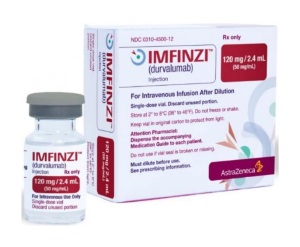AstraZeneca’s Imfinzi (ingredient: durvalumab) has sharpened up its weapon against Roche’s Tecentriq (atezolizumab), the leading treatment for small-cell lung cancer.
AstraZeneca announced the results of the phase-3 CASPIAN study on Imfinzi at the World Conference on Lung Cancer in Barcelona, Spain, held from Saturday to Tuesday.

The CASPIAN study tested combining Imfinzi plus or minus tremelimumab with platinum-based chemotherapy (etoposide plus cisplatin or carboplatin), versus chemotherapy alone as first-line treatment in patients with extensive-stage small-cell lung cancer.
The results showed that the Imfinzi-treated group had 13 months of median overall survival, while the chemotherapy alone group had 10.3 months. The Imfinzi combo therapy reduced the risk of death by 27 percent. After 18 months, 33.9 percent of patients on Imfinzi were alive, compared to 24.7 percent of the control group.
The Imfinzi group notably showed higher marks in endpoints for efficacy, compared to the control group. After 12 months, progression-free survival (PFS) was 17.5 percent with Imfinzi, compared to 4.7 percent with chemo. The Imfinzi group’s objective response rate (ORR) was 67.9 percent, versus the chemo group with 57.6 percent. The response rate after 12 months was also better at 22.7 percent with Imfinzi, versus 6.3 percent with chemo.
Jose Baselga, executive vice president for Oncology Research and Development at AstraZeneca, said, “We are encouraged to see more than a third of small-cell lung cancer patients treated with Imfinzi plus chemotherapy alive at the 18-month landmark, which is remarkable given the aggressive nature of the disease.”
Baselga added that the company planned to take the results to regulatory agencies around the world, showing a strong commitment to expanding Imfinzi’s indication into small-cell lung cancer.
Tecentriq has been the only authorized first-line treatment for extensive-stage small-cell lung cancer so far. In the IMpower133 trial, Roche compared the combo of Tecentriq with chemotherapy (etoposide plus carboplatin) with chemo alone. Based on the result that Tecentriq improved two more months in median overall survival, Roche obtained the approval of the U.S. Food and Drug Administration for Tecentriq.
If AstraZeneca wins the regulatory nod for Imfinzi based on the CASPIAN study, Imfinzi might secure a competitive edge against Tecentriq. While Imfinzi can be used with cisplatin and carboplatin, Tecentriq can be combined only with carboplatin.
Dave Fredrickson, executive vice president and global head of AstraZeneca’s Oncology Business Unit, said in an interview with FiercePharma that standards of care in preferred chemotherapy vary across the globe.
“We know cisplatin is a preferred chemotherapy backbone in Europe and other parts of the world, while on the other hand carboplatin is preferred in the U.S.,” he said.
Fredrickson added that AstraZeneca allowed up to six cycles of chemotherapy in the CASPIAN study, which was the first time in immuno-chemo therapy studies.
AstraZeneca compared the Imfinzi therapy against a “robust, real-world, control arm,” he emphasized.

